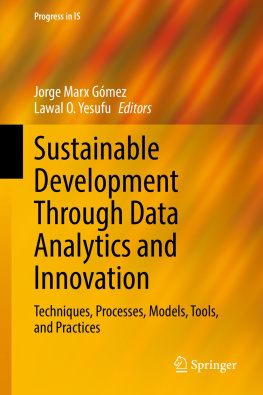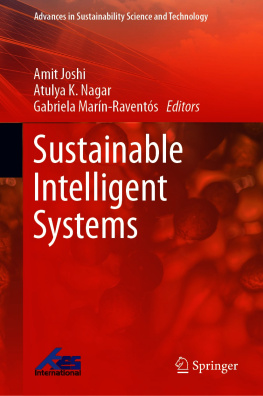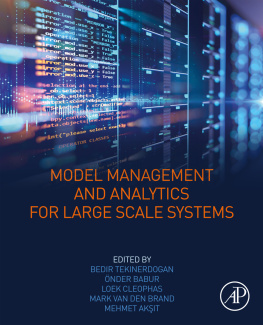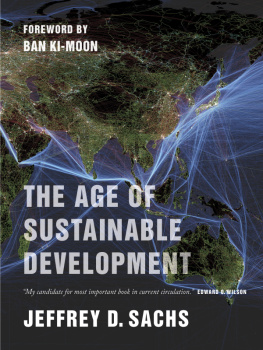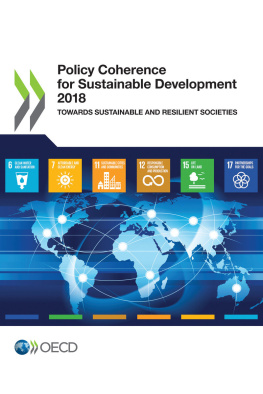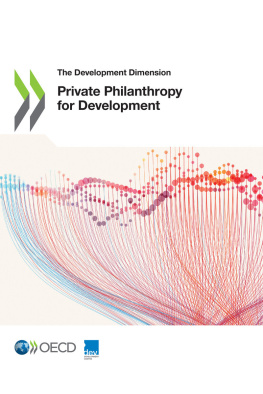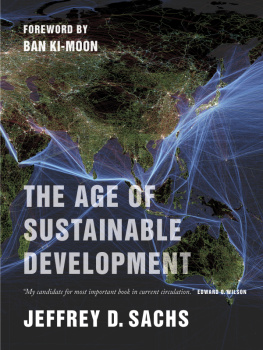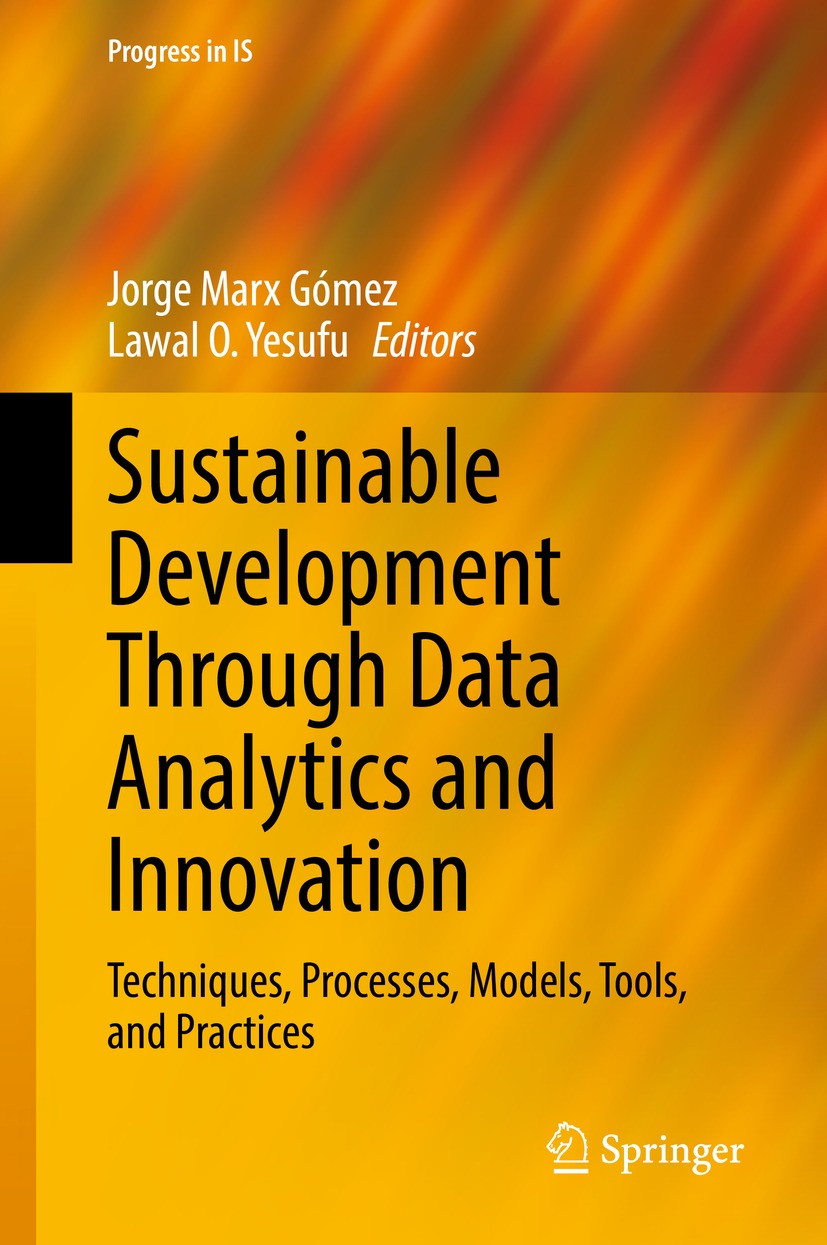Progress in IS
PROGRESS in IS encompasses the various areas of Information Systems in theory and practice, presenting cutting-edge advances in the field. It is aimed especially at researchers, doctoral students, and advanced practitioners. The series features both research monographs that make substantial contributions to our state of knowledge and handbooks and other edited volumes, in which a team of experts is organized by one or more leading authorities to write individual chapters on various aspects of the topic. PROGRESS in IS is edited by a global team of leading IS experts. The editorial board expressly welcomes new members to this group. Individual volumes in this series are supported by a minimum of two members of the editorial board, and a code of conduct mandatory for all members of the board ensures the quality and cutting-edge nature of the titles published under this series.
Editors
Jorge Marx Gmez and Lawal O. Yesufu
Sustainable Development Through Data Analytics and Innovation
Techniques, Processes, Models, Tools, and Practices

Logo of the publisher
Editors
Jorge Marx Gmez
Department of Computing Science, University of Oldenburg, Oldenburg, Germany
Lawal O. Yesufu
Department of Business Analytics, Higher Colleges of Technology, Sharjah, United Arab Emirates
ISSN 2196-8705 e-ISSN 2196-8713
Progress in IS
ISBN 978-3-031-12526-3 e-ISBN 978-3-031-12527-0
https://doi.org/10.1007/978-3-031-12527-0
The Editor(s) (if applicable) and The Author(s), under exclusive license to Springer Nature Switzerland AG 2022
This work is subject to copyright. All rights are solely and exclusively licensed by the Publisher, whether the whole or part of the material is concerned, specifically the rights of translation, reprinting, reuse of illustrations, recitation, broadcasting, reproduction on microfilms or in any other physical way, and transmission or information storage and retrieval, electronic adaptation, computer software, or by similar or dissimilar methodology now known or hereafter developed.
The use of general descriptive names, registered names, trademarks, service marks, etc. in this publication does not imply, even in the absence of a specific statement, that such names are exempt from the relevant protective laws and regulations and therefore free for general use.
The publisher, the authors, and the editors are safe to assume that the advice and information in this book are believed to be true and accurate at the date of publication. Neither the publisher nor the authors or the editors give a warranty, expressed or implied, with respect to the material contained herein or for any errors or omissions that may have been made. The publisher remains neutral with regard to jurisdictional claims in published maps and institutional affiliations.
This Springer imprint is published by the registered company Springer Nature Switzerland AG
The registered company address is: Gewerbestrasse 11, 6330 Cham, Switzerland
Preface
Sustainable development is the idea that human societies must survive and meet their needs without compromising the ability of future generations survival. Specifically, sustainable development is a way of organising society so that it can exist in the long term. This means taking into account both the imperatives of the present and those of the future, such as the preservation of the environment and natural resources or social and economic equity. The aim of this book, Sustainable Development through Data Analytics and InnovationTechniques, Processes, Models, Tools, and Practices, is to contribute to the research and knowledge on sustainable development and the role of business, innovation, and digital technologies in achieving the Sustainable Development Goals (SDGs).
The chapters highlight areas of interest that draw the link between sustainable development and digital technologies. The book addresses topics such as achieving sustainable development through green technologies, thereby highlighting how the concepts and practices of green technologies could create sustainable opportunities for business and, likewise, organisations. In contemporary times, digital technologies are driving by digital functionalities such as Blockchain and its improving innovative use across multiple sectors beyond finance and banking. To achieve more efficient, effective, and sustainable business decisions, organisations heavily rely on the use of data to improvise their current situation and environment as well as predict likely outcomes based on decisions taken today. Hence, data science and data analysis have become increasingly applied in sustainable development. These technologies enable organisations derive better insights into the data as well as the ability to prescribe, diagnose, and predict the sustainable impact of our current business activities.
While digital technologies support business and organisational operations to achieve business and sustainable objectives, there is a human side to technologies that must be considered. Hence, the book includes chapters that draw a relationship between the users of technologies and the technological tools. An instance is the relationship between digitalisation and passenger air travel, as well as the effect of green purchasing behaviour on social media. Also, reimaging corporate reporting in the digital age and a look into the responses to the global Covid-19 pandemic.
Finally, the book includes chapters on the relationships between business analytics, education, innovation industrial development, and sustainability. In line with the objectives, the book highlights key issues in our business environment and to instigate further research and knowledge in sustainability and its applicability to all aspects of life.
Jorge Marx Gmez
Lawal O. Yesufu
Oldenburg, Germany Sharjah, United Arab Emirates
June 2022
Contents
Lawal O. Yesufu and Sami Alajlani
Kashif Farhat , Wajeeha Aslam and Shahira El Alfy
Safwat Al Tal
Ahmad Faisal Hayek
Jiezhuoma La , Iryna Heiets and Cees Bil
Almaz Sandybayev and Benjamin Silas Bvepfepfe
Nora Azima Noordin
Kennedy Modugu
Lucio Poma , Haya Al Shawwa and Ilaria Vesentini
Shatha M. Obeidat and Shahira O. Abdalla
Puteri N. E. Nohuddin , Zuraini Zainol , Marja Azlima Omar , Hanafi Al Hijazi and Nora Azima Noordin
Contributors
Shahira O. Abdalla
Department of Human Resource Management, Faculty of Business, Higher Colleges of Technology, Abu Dhabi, UAE
Sami Alajlani
Department of Finance, Faculty of Business, Higher Colleges of Technology, Abu Dhabi, UAE
Shahira El Alfy
Faculty of Business, Higher Colleges of Technology, Abu Dhabi, UAE
Safwat Al Tal
Department of Business Analytics, Faculty of Business, Higher Colleges of Technology, Abu Dhabi, UAE
Wajeeha Aslam
Department of Business Administration, IQRA University, Karachi, Pakistan

